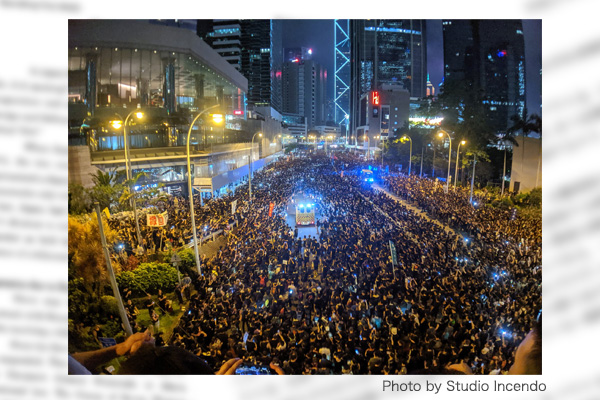Massive protest demonstrations came in Hong Kong against a measure to put the autonomous region under the Chinese Communist Party’s suppressive regime. As the extradition bill pursued by the Hong Kong government is expected to lead pro-freedom Hong Kong citizens to be extradited to mainland China, more than 1 million people participated in the street demonstrations in Hong Kong with population of 7 million. On June 15, the Hong Kong government decided to put off the legislature’s deliberations on the bill. As it has fallen short of withdrawing the bill and is maintaining the position of branding the demonstrations as riots, however, the tensions between the government and demonstrators have remained.
Western countries backing up pro-freedom movement
The Chinese government, though superficially retaining the attitude of leaving the Hong Kong government to decide, has undoubtedly been instructing the authorities in the rear. Behind the decision to put off the deliberations might have been Beijing’s desire to avoid renewed U.S. pressure on Hong Kong at a time its trade war with Washington is escalating.
The U.S. government and Congress have proactively supported Hong Kongers’ move to seek freedom. President Donald Trump said he “understood the reason for the demonstration.” A State Department spokesman said the protest came as Hong Kong citizens did not want their basic rights to be put under China’s control. In Congress, House Speaker Nancy Pelosi said in a statement that this bill “threatens to destroy Hong Kong’s free society.” A bipartisan group of Senate and House members has introduced a bill called the Hong Kong Human Rights and Democracy Act requiring the Department of State to issue an annual report on Hong Kong’s autonomy.
The British foreign secretary, a European Union spokesperson and the Canadian foreign minister have also made remarks supporting the Hong Kong demonstrators.
Abe and lawmakers coy about China
However, the Japanese government’s comments are limited to remarks that include no critical nuances against China. Chief Cabinet Secretary Yoshihide Suga said that the government was “closely watching” the Hong Kong situation “with great interest” and that he hoped that Hong Kong would retain a free, open system and develop democratically and powerfully under the principle of “one country, two systems.” A Foreign Ministry source explained these remarks as “giving consideration to China.” Few Japanese lawmakers have made remarks supporting Hong Kong citizens’ movement against the extradition bill.
Since launching his first administration, Prime Minister Shinzo Abe has called for the “value-based diplomacy.” As freedom and human rights are threatened in Hong Kong, the Japanese government should announce its clearer stance. Lawmakers enjoying greater freedom of speech than the government should make right assertions without being coy about China.
Under the first Abe government, a “Group of Diet members for promoting value-based diplomacy” was established within the ruling Liberal Democratic Party, featuring members’ blunt remarks against China. For example, the group’s leader Keiji Furuya said, “Although Prime Minister Abe implemented a Japan-China summit soon after his assumption of the post, suspicions about China’s hegemonic expansion including military spending growth have not been removed, indicating that China does not share values with Japan.” Shoichi Nakagawa, an adviser to the group, said, “We should not be swallowed by China to become one of its provinces.”
Now that the United States has branded the Chinese regime as having extraneous values, Japanese lawmakers should make such kind of remarks more vigorously.
Tsutomu Nishioka is a senior fellow and a Planning Committee member at the Japan Institute for National Fundamentals and visiting professor at Reitaku University.


